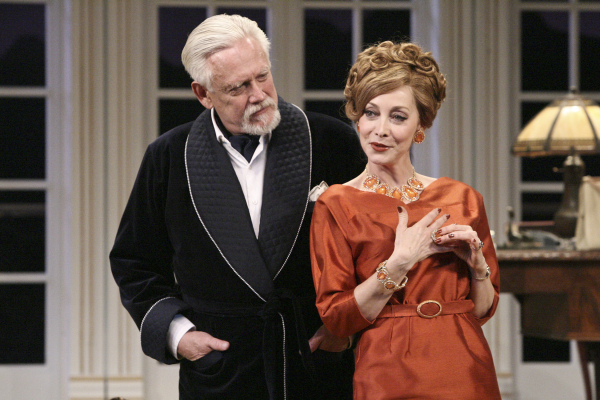A Song at Twilight

(© Michael Lamont)
Last year, the Pasadena Playhouse presented the frothy concoction Fallen Angels, a light comedy about marriage and jealousy amidst lots of alcohol. The elements in A Song at Twilight remain similar to his earlier work, but the consequences carry more weight. Despite being written in 1966, when British law still prosecuted homosexuals, the play openly contemplates homosexual "outing" among celebrities, judging the character not for being gay, but for damaging others by remaining closeted.
Bestselling author Sir Hugo Latymer (played by Bruce Davison) lives in a hotel suite in Switzerland, overlooking Lake Como with his wife of 20 years, Hilde (played by Roxanne Hart). A visitor from his past, actress Carlotta (played by Sharon Lawrence) opens old wounds. After an evening of drinking pink champagne and eating caviar and soufflés, Carlotta reveals that she knows of his past dalliances and plans to exploit that knowledge.
The evening resembles a tennis match. At first Carlotta appears sore that Hugo's recently published autobiography paints her in a poor light. She then reveals plans of her own autobiography in the works. They one-up each other, he belittling her talent, she castigating his cold demeanor. She then hits him where it hurts by unearthing his past secrets.
Davison, in a role originated on stage by the author, embodies a haughty man who has always used people as currency only to discard them when tired of them. Carlotta had been one of them, and Davison sneers at her throughout as if she were a piece of gum on his shoe.
Lawrence brings a sense of entitlement herself. Like Mrs. Cheveley in An Ideal Husband, Carlotta practically smacks her lips in delight over the power she temporarily holds over her captive former boyfriend, Sir Hugo. But she also maintains a self-satisfied sense of importance. She has arrived not to ruin Sir Hugo but to teach a lesson. Lawrence toys with her costar; she wants to punish but also wants to be a savior.
Hart is delightful as Hilde, who is impenetrable to her husband's insults. With a thick, accurate accent, she embodies the house-frau who keeps the family machine moving, but always knows her worth.
Coward's script is filled with his trademark wit. However, beneath the clever dialogue it is not always clear how the audience should feel about the two main characters. It is apparent that the long-suffering Hilde, who fed and cleaned and typed correspondences for Hugo for years, knowing all his secrets and loving him despite himself, is a mother-earth character to be revered. But is Hugo a victim of blackmail and circumstances or is he a pompous bore who deserves to be taken down a peg or two? Is Carlotta an avenger of the wronged, attempting to both punish and push Hugo to redemption or is she a gold-digging hussy, contemptuous of Hugo's fame? The script and the direction by Art Manke does not commit either way, leaving the audience uncertain if they should sympathize or vilify these characters.
Tom Buderwitz's quaint set exemplifies the elegance of a ritzy European hotel room. Costumer David K. Mickelsen dresses the actors in outfits that perfectly suit their characters: Carlotta in a striking red dress, Hugo in a commanding dark-blue dressing jacket, and Hart in a bland grey ladies suit. Lighting designer Peter Maradudin fills the outdoor window setting with such a cool blue tone; it seems the audience is truly visiting the Alps at twilight.
The world has changed in the last 50 years since Coward first staged his play. Today, homosexuality's illegality has been removed (or is making headway in that direction) from the books throughout the U.S. and a large part of the world. But the stigma still remains in both the sporting and entertainment industries with many individuals still living a lie, fearful of the ramifications on their careers. Hilde quotes a line to her husband from Johann Wolfgang von Goethe's poem "Deny yourself! You must deny yourself! That is the song that never ends." A Song at Twilight still resonates today, for as long as people deny their true nature, for them, the song remains the same.










